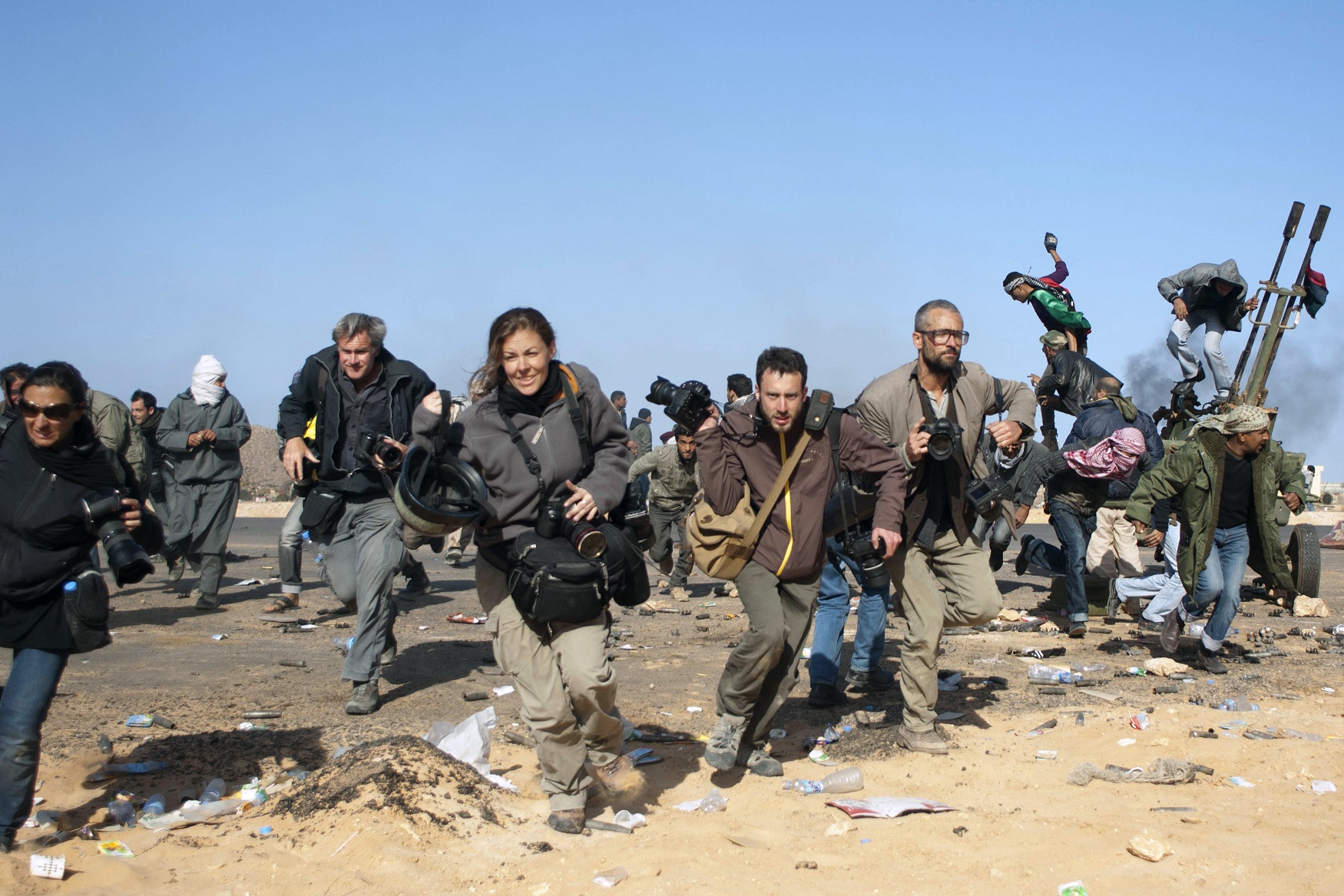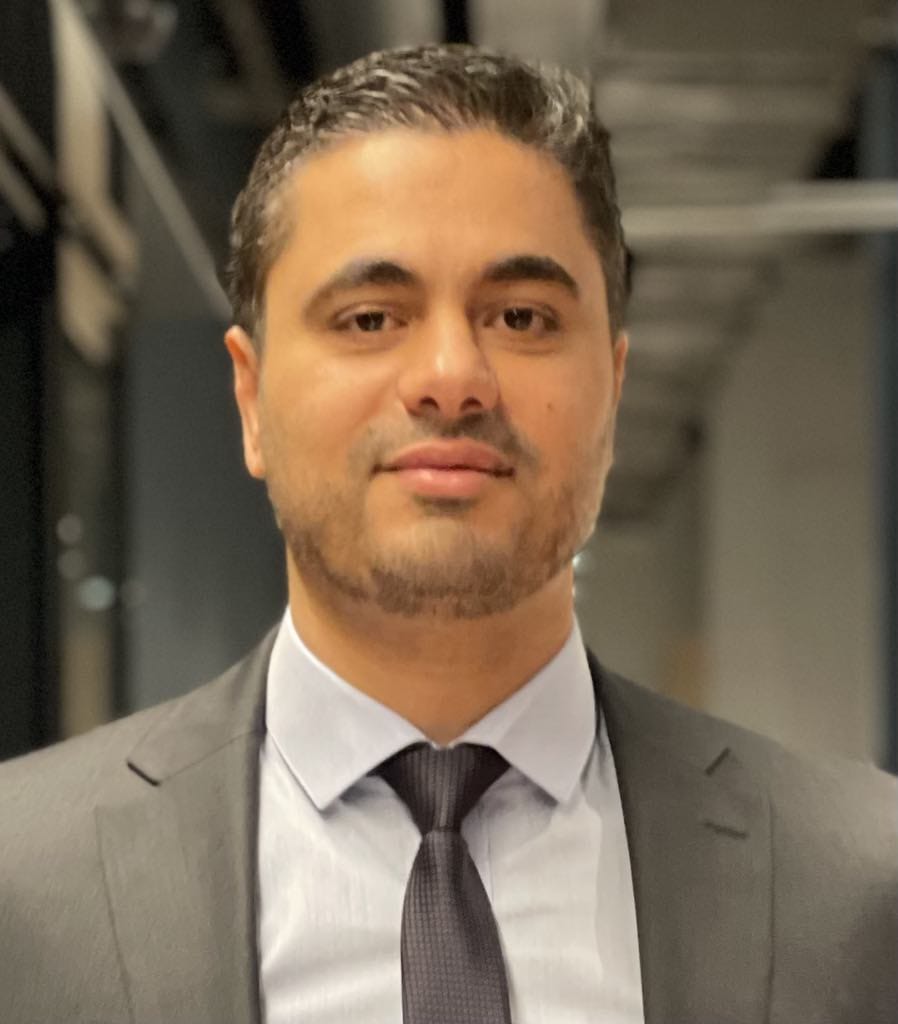بينما كان يتوجه بسيارته الخاصة برفقة زميله لتغطية الأوضاع الميدانية بمنطقة "الطويشة" جنوبي العاصمة الليبية طرابلس، انهال عليهما الرصاص بشكل كثيف وكأنه يأتي من كل مكان.
يقول مراسل وكالة الأخبار الفرنسية حمزة تركية إن "كل شيء كان مفاجئاً.. الخوذة الواقية من الرصاص طارت بشكل عنيف من فوق رأسي، ثم رأيت زميلي ينزف بشدة وقد نالت منه بعض الرصاصات، بالكاد تمالكت نفسي وانطلقت بسيارتي التي تحوّلت إلى ما يشبه المصفاة وابتعدت عن مرمى النيران".
الصحفيون والمراسلون الميدانيون في ليبيا يعانون من أخطار جمّة، فهذا التخصص الذي برز بشكل واضح في السنوات الخمسة الأخيرة نتيجة ما تشهده البلاد من توترات أمنية وعسكرية، يتعرض العاملون فيه لضغوطات ومشاكل خطيرة، سواء كانت مشاكل على المستوى الفني والتقني أو أخرى تتعلق بحياة الصحفيين، ورغم كل تلك الظروف، إلا أن صحفي الميدان أو كما يحلوا لكثيرين تسميته محلياً بـ"المراسل الحربي"، بات يشكّل اليوم أحد أهم الوظائف في الوسط الإعلامي الليبي.
الأوضاع الأمنية الصعبة وعدم استقرار حركة الطيران من ليبيا وإليها، جعلت كثيرا من وسائل الإعلام الدولية تعتمد على مراسلين محليين لتغطية الأوضاع الميدانية، إلى جانب وجود مراسلي القنوات المحلية التي بات جلها يبث من خارج البلاد للأسباب ذاتها.
يضيف تركية: "المراسل الميداني يعتبر شيئا جديدا في ليبيا، وقد جذب هذا المجال الكثير من الشباب، لكن الخطير في الأمر هو عدم وجود توعية وتدريب للمراسلين الذين يجدون أنفسهم في ميادين قتال عنيف، وفي كثير من الأحيان يصبحون أهدافاً سهلة لأحد أطراف الصراع".
غياب التدريب
ويعاني الصحفيون في ليبيا من قلة التدريب في مجال التغطية الميدانية في أماكن النزاع، وهو ما تسبب في إصابة العديد من المراسلين أثناء تغطياتهم، وبحسب مختصين فإنه كان يمكن تجنب كثير من هذه الإصابات إذا تحصّل المراسل على دورة، وإن كانت متواضعة، في أساسيات الحماية والتأمين أثناء تغطية مناطق النزاع.
ويجازف الصحفيون الشباب من أجل الحصول على صور ومقاطع حصرية في محاور القتال إما لتزويد المؤسسات التي يعملون بها وإما لنشرها عبر وسائل التواصل الاجتماعي والتباهي بها، وهو تصرف يعرضهم للخطر خصوصاً أن كثيرا منهم غير معدّ أو مدرّب لمواجهة مواقف كهذه، وليست لديهم أي خبرة في اتخاذ تدابير الأمان والانسحاب عند تعقد الأمور.
مؤخراً، ومنذ الهجوم المسلح الذي أطلقته قوات اللواء المتقاعد خليفة حفتر على العاصمة طرابلس في 4 إبريل الماضي، أصيب ما لا يقل عن 32 صحفيا وفقاً لسجلات التوثيق بالمركز الليبي لحرية الصحافة -مركز غير حكومي- وهو ما دعا إدارة الإعلام الخارجي بوزارة الخارجية في حكومة الوفاق إلى مطالبة الصحفيين والإعلاميين بضرورة اتخاذ كافة التدابير وعدم تعريض أنفسهم للخطر، والحفاظ على سلامتهم الشخصية أثناء تغطية أخبار الجبهات.
ضعف التنسيق الرسمي
غير أن الخلل لا يقتصر فقط على ضعف التدريب، فكثير من الصحفيين والجهات المختصة اتهمت حكومة الوفاق بالتقصير في واجبها تجاه الصحفيين وتنسيق عمليات دخولهم إلى جبهات القتال، إضافة إلى عدم وجود معدات الحماية اللازمة والتي يمكن للحكومة أن توفّرها في أوضاع كالتي تمرّ بها ليبيا، هذا القصور جعل المراسلين والصحفيين يعتمدون في دخولهم إلى ميادين القتال على علاقاتهم الشخصية بالمقاتلين.
مصور قناة الجزيرة ناصر جبريل الذي أصيب بمحور الطويشة برفقة تركية يقول إن ظروف العمل باتت صعبة جدا في غياب التنسيق ومكتب إعلام تابع للحكومة يلجأ إليه الصحفي عند قيامه بعمله.
ويضيف جبريل: "لا يوجد تنسيق ولا أي جهة يمكن التعامل معها، نقوم بالتحرك عبر علاقاتنا الشخصية بالمقاتلين على أرض المعركة، وهو أمر محفوف بالمخاطر، آخر مرة كنت في الميدان وجدنا أنفسنا في مرمى نيران قوات تابعة لحفتر، رغم إبلاغنا من قبل بعض المقاتلين بأن الطريق آمن، وهو ما تسبب في إصابة خطيرة في كتفي استوجبت خضوعي لعمليتين جراحيتين خارج ليبيا".
ويطالب جبريل بضرورة وجود جهة رسمية يجري التعامل معها وتيسر دخول الصحفيين إلى المناطق التي تشهد توترات أمنية لتفادي الكثير من المشاكل والخروقات، إلى جانب ذلك يشدد زميله تركية على أهمية أن يتم توفير دورات تدريبية للمراسل والتصوير الميداني في مناطق النزاع.
توفير معدات الحماية
من جهته، أرجع مدير المركز الليبي لحرية الصحافة محمد الناجم ازدياد عدد الإصابات في صفوف الصحفيين إلى عدم الالتزام بارتداء معدات الحماية والأمن والمتمثلة في الخوذة والصدرية الواقيتين من الرصاص.
"جزء كبير من الإصابات متعلق بعدم ارتداء معدات الحماية اللازمة، إما بسبب إهمال الصحفي لذلك أو لعدم توفرها، ونحن في المركز نعمل على توفير هذه المعدات لكننا نواجه بعض الصعوبات؛ لأن بعض الشركات ترفض توريدها كونها معدات شبه عسكرية في ظل استمرار حظر توريد السلاح إلى ليبيا المفروض من الأمم المتحدة".
الناجم يشير إلى أن حكومة الوفاق وحفتر يعتمدان على فريق خاص بهما لتوثيق الأحداث، بينما يسعى كثير من الصحفيين المستقلين للوصول إلى ميادين القتال دون تنسيق مع الجهات الرسمية إن وجدت، وهو ما يجعلهم دون حماية كافية أثناء تغطيتهم، داعياً الصحفيين إلى عدم الحضور في مناطق القتال دون إعلام الجهات الرسمية مع ضرورة الالتزام بمعدات الحماية اللازمة.
الصحفيون في مرمى النيران
لم يسلم كثير من الصحفيين المحليين أو الأجانب الذين يعملون ميدانيا على تغطية الأحداث في محاور القتال من الاستهداف، حيث تعرض الصحفي عبدالعزيز عيسى والمصور وليد زرموح إلى إصابات بشظايا قصف جوي بينما كانا يقومان بتغطيتهم الصحفية، كما اعتقل مسلحو "الكاني" بمدينة ترهونة -قوة غير نظامية تابعة لحفتر- لأكثر من 20 يوما صحفيي قناة ليبيا الأحرار محمد القرج ومحمد الشيباني أثناء تغطيتهما الاشتباكات جنوب طرابلس في مايو الماضي، قبل أن يطلق سراحهما بعد أن أثيرت قضيتهما محليا ودوليا، إضافة إلى تعرض الصحفي المصور المجري "جرجيلي سابو" التابع لتلفزيون (آر تي إل) المجري لإصابة أثناء قصف طيران حفتر لمحور صلاح الدين جنوب طرابلس.
التدريب يعني الحماية
وبخصوص التدريب يقول تركية: "ربما أكون من بين الصحفيين المحظوظين في ليبيا، فقد سبق أن حصلت على دورة تدريبية مكثفة في الخارج واستفدت منها كثيراً، ورغم كل ذلك فقد أصبت ثلاث مرات، ولو لم أكن ملما ببعض إجراءات السلامة التي مكنتي من الخروج بأقل خسارة ممكنة، لكان الوضع أخطر بكثير".
تركية يطمح إلى افتتاح مركز تدريب في ليبيا حتى يتمكن من توعية زملائه الصحفيين الذين قد يجدون صعوبة في السفر إلى الخارج لتلقي مثل هذه الدورات التي قد تكون في العادة مرتفعة التكليف.
"أحياناً ينتابني شعور بأنني لن أعود إلى هذه المهنة، خاصة في الموقف الأخير الذي تعرضت له، فقد كان بيني وبين الموت ربما سنتيمترا واحدا بعد أن نزعت الرصاصة الخوذة الواقية من فوق رأسي، لكنني وبعد أخذ قسط من الراحلة أجد نفسي في الميدان من جديد".
الصحفيون في ليبيا باتوا بين خيارين لا ثالث لهما، إما العمل في هذه الظروف الصعبة وإما التخلي عن مهنتهم والبحث عن مهنٍ أخرى، ما جعل منظمات دولية ومنها مراسلون بلا حدود تصف ليبيا بالثقب الأسود للأخبار والمعلومات؛ بسبب صعوبة العمل الصحفي في ليبيا نتيجة لارتفاع الانتهاكات ضد الصحفيين وتعرضهم للمخاطر، وهو ما أجبر كثيرا منهم إلى الهجرة صحبة وسائل الإعلام المحلية إلى خارج البلاد.
* الصورة: عمر سبحاني - رويترز








































